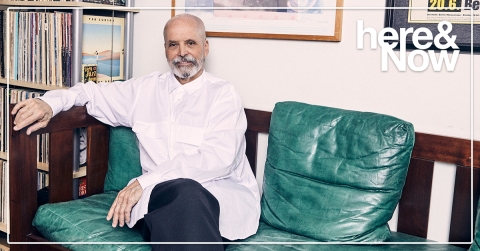Glenn Kotche marks the world premiere of his new work, Anomaly, with Kronos Quartet, at the 25th Anniversary San Francisco Jazz Festival in a discussion of the story behind the collaboration (commissioned for Kronos by the Angel Stoyanof Commission Fund); the unique challenges of writing, as a percussionist, for string quartet; and the very personal inspiration for the piece.
Glenn Kotche will join Kronos Quartet on October 25 and 26 at the 25th Anniversary San Francisco Jazz Festival for the world premiere of his piece Anomaly. In the concerts' program note, excerpted here, Glenn discusses the story behind the collaboration (commissioned for Kronos by the Angel Stoyanof Commission Fund); the unique challenges of writing, as a percussionist, for string quartet; and the very personal inspiration for the piece:
After seeing a Kronos Quartet performance in early 2006, I got the idea to compose a string quartet. I wanted to do it from my perspective as a percussionist, treating the four members of the quartet like the varying relationships and roles of my limbs when I play the drum set. I also thought it would be interesting to arrange it with the addition of an optional drum set part. I was happily surprised when David Harrington, upon hearing my record Mobile, called me to request the exact same thing. He suggested that I write a piece for string quartet with an optional fifth percussion part that was “rhythmic with percussive colors” and—much more dauntingly—“something vital, beautiful, and
wonderful.”My closest uncle, Eddie Kotche, died just around the time of that Kronos performance. The night that he passed, I went home and improvised a short melody on the vibraphone. This would become the dominant, recurring theme in what would eventually be titled Anomaly. This melody is present in some form in all seven movements. In the fifth movement, the theme is played in its entirety on the handbells, emulating the tonal color of the vibraphone.
My uncle was an anomaly. He had an incredible zest for life and an uproarious sense of humor despite being severely challenged throughout his life by cerebral palsy, a condition that left him with very little control over his limbs. He was dependent on family for every daily function. After losing him, I began to think about my reliance on physical motion and coordination for my self-expression and livelihood, and about the dichotomy between our physical circumstances. This led to ruminations on the mobility and interdependence of the parts of our bodies, and also on how people rely on each other. I thought about the physical as well as emotional discomfort and pain that he must have felt on a daily basis. At the same time, I remembered the love that he gave and received from his family and friends throughout his long, full life ...
Although the origins of Anomaly are deeply personal … I wrote the piece to be broad in its emotional range and appeal. I wanted it to be a collaboration of disparate musical themes that sometimes work in concert and at other times conflict and rub against one another. I wanted the individual instruments to experience both freedom and restriction. I wanted Kronos to be dependent on each other for the execution of certain melodies and musical passages. The main motif that appears in each movement is, for me, symbolic of the love and experience that those dear to us leave behind. Just because they die, doesn’t mean their love dies. That spirit is woven into our lives and is part of the range of our experiences. I wanted to fulfill David Harrington’s request and compose a vibrant and exciting piece with moments of humility and naked beauty with plenty of rhythmic vitality. As the first piece that I’ve composed outside the realm of percussion, it is for me—also an anomaly. Thanks to all who had a hand in making it a reality.



